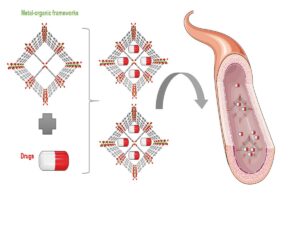2023 vol 2 issue 2
Review
Kornelia Hyjek 1 *, Przemysław Jodłowski 1
1 Faculty of Chemical Engineering and Technology, Cracow University of
Technology, 31-155 Kraków, Poland
* Correspondence to: kornelia.hyjek@doktorant.pk.edu.pl
pp. 118-189
DOI: 10.58332/scirad2023v2i2a03
Abstract
In recent years, the number of materials used as drug delivery systems (DDS) has increased dramatically. The widespread use of DDSs has improved both the safety and efficacy of therapy. The systems currently in use pose numerous drawbacks and require proper improvements. Although many modern materials are being developed, metal-organic frameworks (MOFs) deserve special attention. Thermal and chemical stability, high specific surface area, low toxicity, high biocompatibility, and great potential for modification are the main features enabling MOFs to be used as DDS. In this review, we describe MOFs, their structure, synthesis, and characterization, as well as drug loading, drug release kinetics, and bioassays. A critical approach is to outline the disadvantages as well as the limitations of MOFs and to identify areas that need to be studied more thoroughly. Nonetheless, the prospective nature of MOFs as DDS and potential adsorbents in overdose or poisoning is presented and highlighted.
Keywords
Drug delivery systems, Metal-organic frameworks, Synthesis, Characterization, Drug loading, Biocompatibility
First published: 05.06.2023
